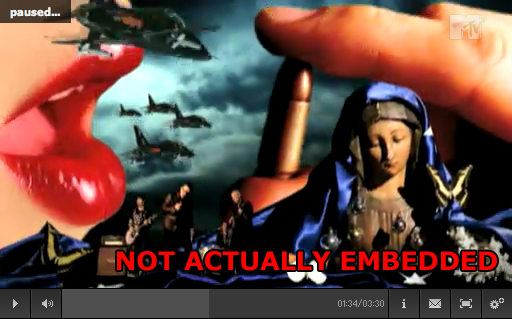
When NBC Universal and News Corporation-backed Hulu launched in Fall 2007, it was a signal that old television media might actually grasp the distributive power of the internet. Not only were great programs made available for free as streaming videos, users could grab and embed them anywhere online – in their entirety or just as clips.
So it’s a bit of a shame to see another giant media conglomerate, Viacom, buck this trend and actually clamp down on the embedding of videos from the MTV Network. Yesterday in a post to its developer blog, a staff member for MTVN developer services announced that video embeds would no longer be available through MTV’s API, starting sometime in early March.
Currently, developers can build websites that embed videos from MTV, VH1, CMT and Logo (such as this one that also embeds videos from YouTube). But soon developers will be allowed to display only thumbnails and meta data associated with MTV’s videos. If users want to watch the actual videos, they’ll have to follow links back to webpages that are owned and monetized by MTVN.
This not only means that developers can no longer build websites that automatically incorporate MTVN’s high quality video content; you simply won’t find legitimate embeds from MTVN anywhere, since you’re already not allowed to embed the videos as an end user (Correction: End users can actually grab an embed code from the player and there’s been no announcement as to whether this will change as well).
We don’t know yet why MTVN decided to pull the plug on the most useful part of its API, but we do know that at least several developers are angry, especially since they helped MTVN debug the API only to see their capabilities limited. We’ve sent an email to the staff member who posted the announcement and hope to hear back from him soon.
Update: MTVN Corporate Communications representative Mark Jafar has gotten back to me with the following details:
All of our online video is and will remain embeddable for end users, just like Hulu. That includes music videos, clips and full-episode content across MTV.com, VH1.com, ComedyCentral.com and our entire Web portfolio.
The only thing we’re pulling back is fully open access to our music video API, and it’s purely an issue of economics. Every music video we stream through the API costs us money due to our deals with the record labels, regardless of whether an ad is attached or not. So, allowing developers to use the open music video API can be a money-losing proposition for us. However, we’re absolutely open to extending the music video API to third-party publishers who are willing to work with us to monetize. It’s all about striking that right balance between innovation and commerce as we continue to move forward and try new things.